Contents:
Hopefully the days of giving a class homework that simply states ‘Revise for your test’ are long gone. Students need explicit instruction in study skills just as much as they need it for their subject knowledge and it is something that has been overlooked in the past but should now be at the forefront of teachers’ minds.
I believe that humans are inherently creatures of comfort and this applies to studying too – we will naturally veer to studying the parts of topics we enjoy and feel we know best, and avoid those that we struggle with. One of our roles as teachers is to ensure students identify those areas and force them into spending time on them!
Active revision
Lots of research has shown that for revision to be effective it must be active – for revision, the process of actively recalling information is more important than the product of that process.
Kate Jones describes retrieval practice as “the act of recalling learned information from memory (with no or little support) and every time that information is retrieved, or an answer generated, it changes that original memory into a stronger one” so it is our job to guide students into doing this effectively.
Asking them to do a ‘mind dump’ of everything they know about a topic onto a blank sheet of paper can be a daunting task to a student. In their mind that blank sheet needs filling and they can be scared they don’t know enough. I have found that making the task one of extremely low stakes can persuade them to take the plunge. A statement such as “this isn’t a test, I’m not going to mark what you produce. All this is, is a chance for you to find out what is and isn’t in your memory so you can discover where to focus your independent study time” could be a way to introduce this sort of task to reduce the pressure students may feel to make it more productive.
If you have students that need it then providing a scaffold can help them take the first steps in this process, again reducing the pressure to aid productivity:
- Sentence starters
- A list of keywords
- A diagram, photo, or map
- Short response questions

Style over substance
It is common for students to be keen to produce eye-catching revision materials but put very little thought into how they use them.
- If they are making flashcards then ensure they are introduced to the Leitner method.
- If they’ve made posters, ask them if they ever cover them up, try and rewrite the information, and then compare their version with the original – they can then see which parts they have retained and which need more focus.
- If they’ve made lots of notes, are they trying to summarise them rather than just re-reading them? These summaries can then be used as prompts or for a study partner to ask questions from. Check out this video on ‘how to summarise’.
Persuading students that the appearance of their materials is less important than their use can be an uphill struggle with some but it’s a fight worth having!
Studying doesn’t give quick gratification, it takes prolonged effort to see the fruits of your labour which is one reason why students find it so difficult. Teaching them effective strategies will mean you can show them they don’t need to find more time to study if the time they spend is used in a ‘smarter’ way.







Comments